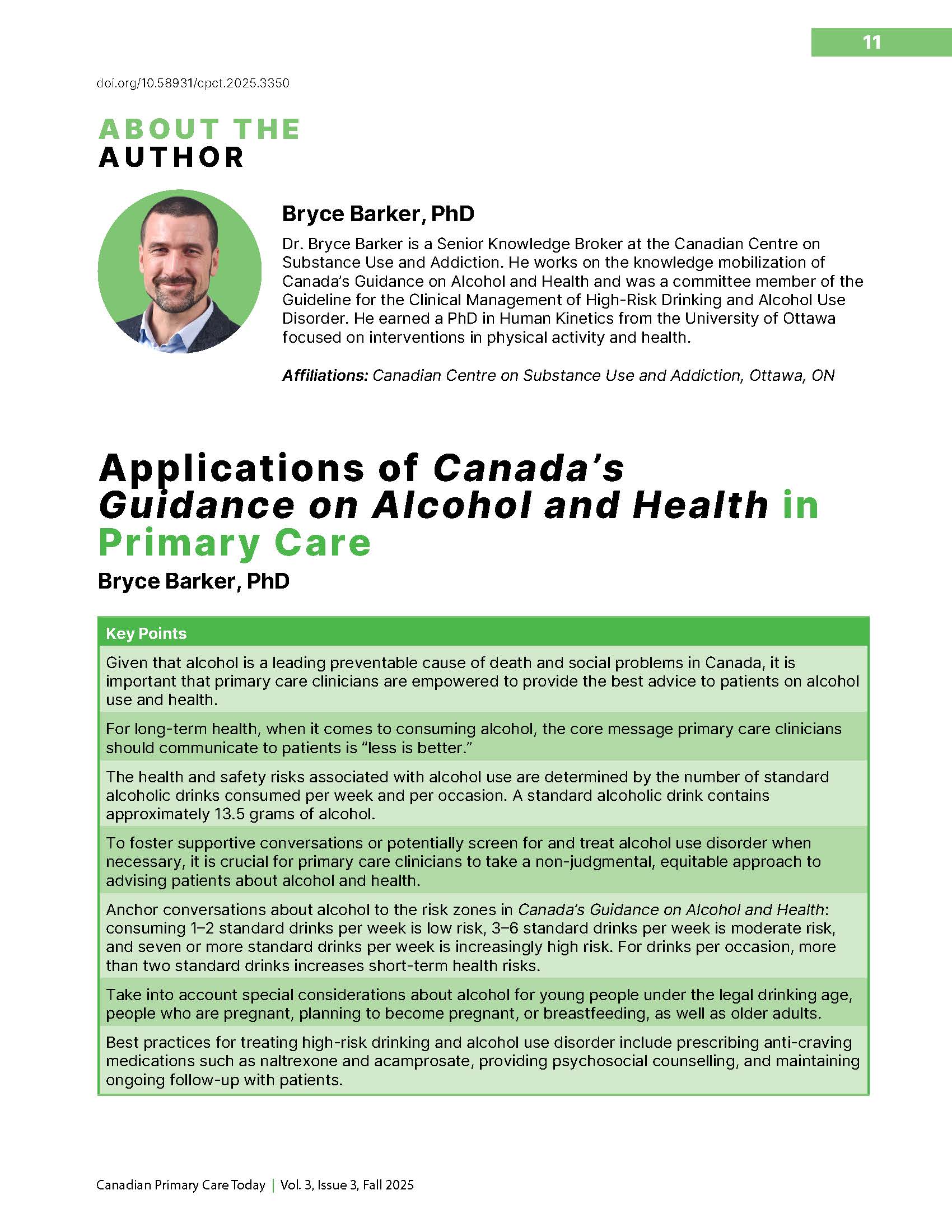Applications of Canada’s Guidance on Alcohol and Health in Primary Care
DOI:
https://doi.org/10.58931/cpct.2025.3350Abstract
Key Points
• Given that alcohol is a leading preventable cause of death and social problems in Canada, it is important that primary care clinicians are empowered to provide the best advice to patients on alcohol use and health.
• For long-term health, when it comes to consuming alcohol, the core message primary care clinicians should communicate to patients is “less is better.”
• The health and safety risks associated with alcohol use are determined by the number of standard alcoholic drinks consumed per week and per occasion. A standard alcoholic drink contains approximately 13.5 grams of alcohol.
• To foster supportive conversations or potentially screen for and treat alcohol use disorder when necessary, it is crucial for primary care clinicians to take a non-judgmental, equitable approach to advising patients about alcohol and health.
• Anchor conversations about alcohol to the risk zones in Canada’s Guidance on Alcohol and Health: consuming 1–2 standard drinks per week is low risk, 3–6 standard drinks per week is moderate risk, and seven or more standard drinks per week is increasingly high risk. For drinks per occasion, more than two standard drinks increases short-term health risks.
• Take into account special considerations about alcohol for young people under the legal drinking age, people who are pregnant, planning to become pregnant, or breastfeeding, as well as older adults.
• Best practices for treating high-risk drinking and alcohol use disorder include prescribing anti-craving medications such as naltrexone and acamprosate, providing psychosocial counselling, and maintaining ongoing follow-up with patients.
References
Paradis C, Butt P, Shield K, Poole N, Wells S, Naimi T, et al.; Low-Risk Alcohol Drinking Guidelines Scientific Expert Panels (2023). Canada’s Guidance on Alcohol and Health: Final Report [Internet]. Ottawa (ON): Canadian Centre on Substance Use and Addiction; 2023 [cited 2025 Sep 10]. Available from: https://www.ccsa.ca/en/canadas-guidance-alcohol-and-health-final-report
Rani S, Laupacis A. “Less is better” is the best message when talking to patients about alcohol. CMAJ. 2023;195(36):E1232–E1233. doi:10.1503/cmaj.231238 DOI: https://doi.org/10.1503/cmaj.231238
Wijayasinghe S. Is two drinks a week really the new limit? The Globe and Mail [Internet]. 2025 Aug 18 [cited 2025 Sep 10]. Available from: https://www.theglobeandmail.com/life/health-and-fitness/article-health-alcohol-doctor-sheila-wijayasinghe/
Canadian Research Initiative in Substance Misuse. Canadian Clinical Guideline: High-Risk Drinking and Alcohol Use Disorder [Internet]. Vancouver (BC): BCCSU/CRISM; 2023 Oct [cited 2025 Sep 10]. Available from: https://www.bccsu.ca/wp-content/uploads/2023/10/Canadian-AUD-guidelines_ENG.pdf
University of British Columbia Continuing Professional Development. New guidance on alcohol and health from the Canadian Centre on Substance Use and Addiction. This Changed My Practice [Internet]. 2024 Mar 12 [cited 2025 Sep 10]. Available from: https://thischangedmypractice.com/guidance-on-alcohol-and-health/
Canadian Centre on Substance Use and Addiction. Knowing your limits with alcohol: a guide for Canadians [Internet]. Ottawa (ON): CCSA; 2023 [cited 2025 Sep 10]. Available from: https://www.ccsa.ca/sites/default/files/2023-08/CCSA-Knowing-Your-Limits-with-Alcohol-Guide-2023-en.pdf
Canadian Institute for Substance Use Research, University of Victoria. KnowAlcohol.ca [Internet]. Victoria (BC): University of Victoria; 2025 [cited 2025 Sep 10]. Available from: https://knowalcohol.ca/
New Brunswick Medical Society. It’s your choice. know the risks. — Resources [Internet]. [cited 2025 Sep 10]. Available from: https://yourchoiceknowtherisks.ca/resources
Canadian Coalition for Seniors’ Mental Health (CCSMH). Alcohol Use – Clinical Guidelines [Internet]. Markham (ON): CCSMH; 2025 [cited 2025 Sep 12]. Available from: https://ccsmh.ca/areas-of-focus/alcohol-use/clinical-guidelines/
BC Centre on Substance Use; CRISM. Canadian Guideline for the Clinical Management of High-Risk Drinking and Alcohol Use Disorder [Internet]. Vancouver (BC): BCCSU/CRISM; 2023 [cited 2025 Sep 10]. Available from: https://helpwithdrinking.ca/
Sherk A, Levesque C. Canadian Centre on Substance Use and Addiction. Alcohol consumption and adherence to Canada’s Guidance on Alcohol and Health [Internet]. Ottawa (ON): CCSA; 2025 Mar [cited 2025 Sep 10]. Available from: https://www.ccsa.ca/sites/default/files/2025-03/Alcohol-consumption-and-adherence-to-Canadas-Guidance-on-Alcohol-and-Health-en.pdf
Canadian Substance Use Costs and Harms Scientific Working Group. Canadian substance use costs and harms 2007–2020 [Internet]. Ottawa (ON): Canadian Centre on Substance Use and Addiction; 2023 [cited 2025 Sep 10]. Available from: https://csuch.ca/assets/documents/reports/english/Canadian-Substance-Use-Costs-and-Harms-Report-2007-2020-en.pdf

Published
How to Cite
Issue
Section
License
Copyright (c) 2025 Canadian Primary Care Today

This work is licensed under a Creative Commons Attribution-NonCommercial-NoDerivatives 4.0 International License.
